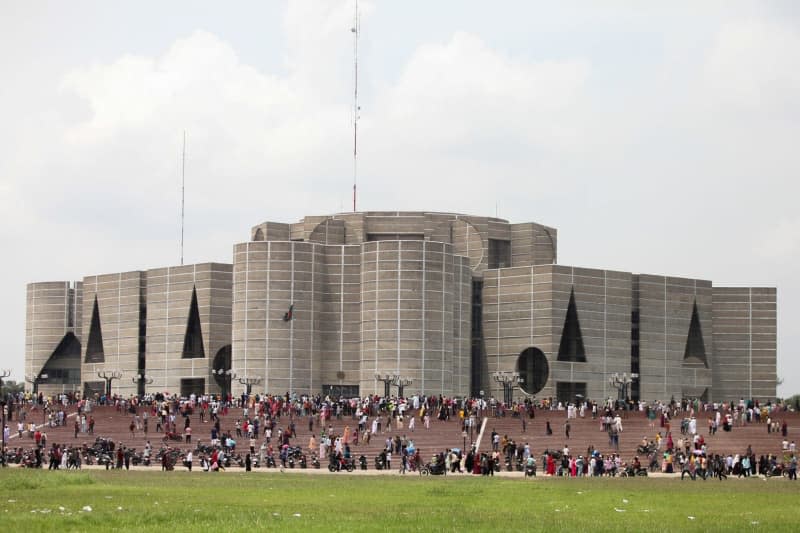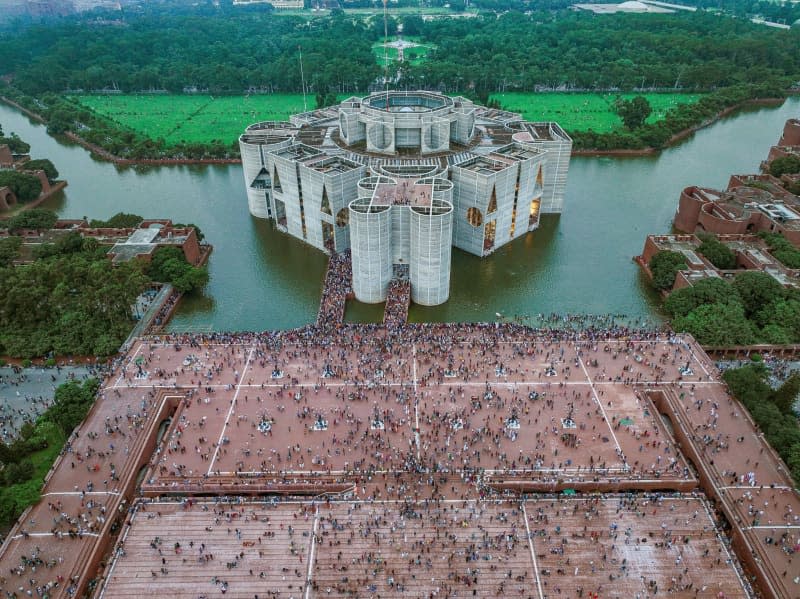Bangladeshi President Mohammed Shahabuddin is set to appoint Nobel laureate Mohammad Yunus as the head of the country’s interim government, one day after prime minister Sheikh Hasina was forced to resign and flee to India following mass protests.
A presidential spokesman told dpa by phone that the decision to appoint the 84-year-old Yunus came at a meeting attended by the president, senior military officers, civil society members and representatives of student protest organizers.
The other members of the interim government will be chosen after consultation with political parties, he said.
The president earlier dissolved parliament, after weeks of violent protests that left nearly 400 people killed led Hasina to resign and flee Bangladesh on Monday.
The demonstrations reached a climax the same day with the storming of a government palace as local media reported that widespread violence saw more than 100 killed across the country.
Early on Tuesday, the situation on the streets of the capital Dhaka was calm, after a curfew imposed by Hasina’s administration was lifted.
Parliament dissolved in consultation with army, protesters
Hasina resigned on Monday after 15 years in power. Her Awami League party won a large majority in January elections, but is set to be removed from power after President Shahabuddin dissolved parliament.
“The decision for the dissolution of parliament was taken following the president’s discussions with chiefs of three staffs of armed forces, leaders of different political parties, representatives of civil society and leaders of the Anti-Discrimination Student Movement,” the presidential office said in a press statement.
Hasina’s capitulation follows weeks of protests, organized by the Anti-discrimination Student Movement, which started in early July and initially demanded an end to a controversial government job quota system.
The demonstrations spread nationwide and turned violent in mid-July as Hasina attempted to cling to power.
Protest organizers pick 2006 Nobel winner
Earlier on Tuesday, Nahid Islam, one of the top coordinators of the protests, said in a video message posted on Facebook that Yunus had agreed to take on the role of interim leader.
“He has given consent considering the present situation of the country,” Nahid said, adding that the names of the other members of the interim administration would be made public later in the day.
Yunus, a social entrepreneur, banker and economist, was awarded the Nobel Peace Prize in 2006 for pioneering the concepts of microcredit and microfinance.
Key Hasina opponent Zia freed from house arrest
The presidential statement also said that former prime minister Khaleda Zia, chairwoman of the Bangladesh Nationalist Party and Hasina’s main political rival, was released from house arrest.
Zia was convicted in graft cases in 2018 and was living at her home in Dhaka after she was conditionally released from prison on humanitarian grounds in 2022, as the government suspended her term.
The statement also said that the process of releasing political prisoners, including those who were arrested during the anti-discrimination student movement, has started.
Massive violence, deaths following Hasina‘s exit
More than 100 people were killed and numerous others were injured in violence that erupted nationwide after Hasina resigned, local media reported on Tuesday.
Most deaths came from protesters’ attacks on police buildings, public establishments, and the residences and business of Hasina’s supporters, the reports said.
Bangla daily Prothom Alo reported some 109 people were killed during Monday’s vandalism. The newspaper put the death toll at 440 since July 16, when violence flared up during the anti-government protests.
The death toll could not be verified independently by dpa.
Firefighters retrieved the bodies of 24 people from a residential hotel owned by a local Awami League leader in south-western town of Jessore after the facility was set to fire, an official said.
In another arson attack, firefighters found the charred bodies of four people in a six-story building owned by a leader of the Awami League party in south-western Chuadanga district after the protesters set fire to it, Bangla daily Prothom Alo reported.
In southern Chandpur district, a mob lynched a low-level local government official who was loyal to the Awami League – and his son – while as they were trying to flee the area, the newspaper said.
Some 518 prison inmates fled after a mob broke opened a jail in northern Sherpur district in the afternoon, Abdullah Al Khairum, the chief district administrator said, adding that the mob looted arms, ammunition and other valuables from the prison facility on Monday soon after the news aired that Hasina resigned.
Most of Dhaka’s police stations remained empty on Tuesday as the officers were pulled back to police barracks over safety concerns, an official at the Dhaka Metropolitan police said on condition of anonymity.
Offices and schools were opened as curfew was lifted on Tuesday morning, but attendance was very low. Dhaka’s traffic was thin with three-wheeler rickshaws dominating the streets.











